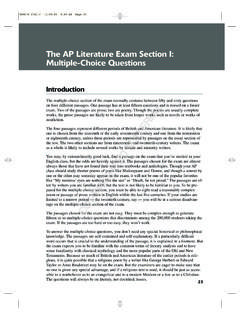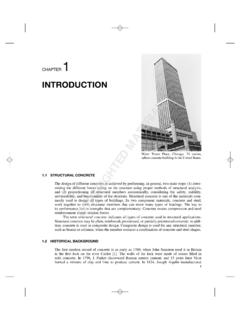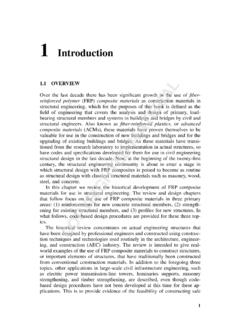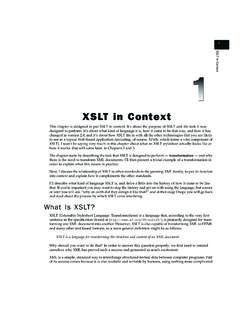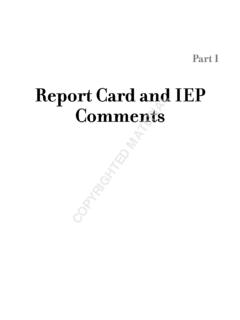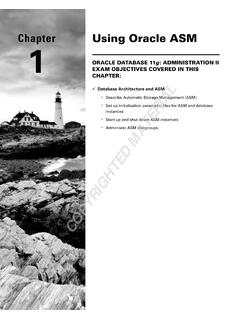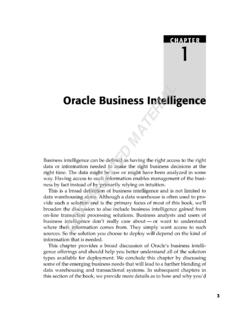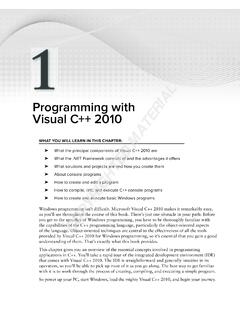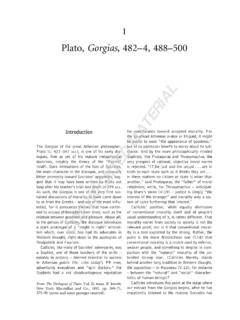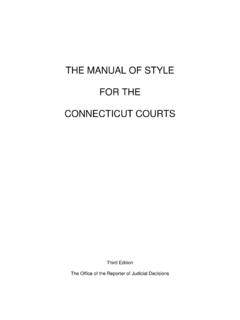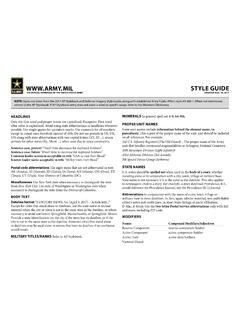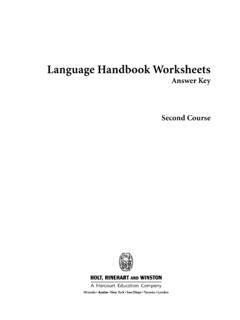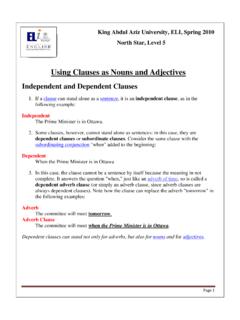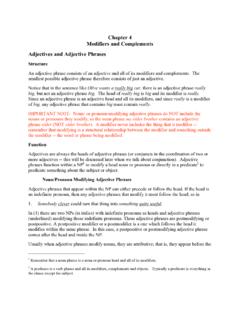Transcription of Chapter 6 PHRASES, CLAUSES, AND SENTENCES - Wiley
1 Chapter 6 PHRASES, CLAUSES, AND SENTENCESC hapter Check-In Recognizing phrases identifying independent and subordinate clauses Understanding sentencesClauses and phrases are the building blocks of SENTENCES . A phrase is agroup of words that act as a part of speech but cannot stand alone asa sentence. clauses are groups of words that have a subject and a predi-cate. Independent clauses express a complete thought and can stand aloneas a sentence but subordinate clauses depend on other parts of the sen-tence to express a complete sentence expresses a complete thought and contains a subject, a nounor pronoun, and a predicate, a verb or verb phrase. The four basic typesof SENTENCES simple, compound, complex, and compound-complex use phrases and clauses in varying degrees of complexity. The PhraseA phraseis any group of related words that, unlike a sentence, has no subject-predicate combination.
2 The words in a phrase act together so thatthe phrase itself functions as a single part of speech. For example, somephrases act as nouns, some as verbs, some as adjectives or adverbs. Remem-ber that phrases can t stand alone as chance that you ll ever be asked to differentiate between a gerundphrase and an infinitive phrase or a participial phrase and a prepositionalphrase is small. So why learn about these phrases? First, if you understandhow they work, you can avoid mistaking them for SENTENCES . Second, you can avoid misplacing them or leaving them dangling in SENTENCES (See6393-9 4/24/01 9:31 AM Page 55 Chapter 7). Third, you can learn to use them effectively in combining sen-tences. A series of short, choppy SENTENCES can be turned into a moremature, effective sentence by using phrases and clauses (See Chapter 6).
3 The Prepositional PhraseThe most common phrase is the prepositional ll find thesephrases everywhere in SENTENCES , clauses , and even in other phrases. Eachprepositional phrase begins with a preposition (in, of, by, from, for,etc.; seeChapter 5 for a more complete list) and includes a noun or pronoun thatis the object of the roomofthe peoplebythe river fromthe teacherforthe partyThe object of a preposition can have its own modifiers, which also are partof the prepositional phrase. in the smoky, crowdedroom of the remaining fewpeople by the rushingriverfrom the tired and frustratedteacher for the midnight victorypartyPrepositional phrases function as either adjectives or adverbs. The woman in the trench coat pulled out her cellular prepositional phrase here acts as an adjective describing the nounwoman. Most of the audience snoozed during the tedious performance.
4 The prepositional phrase here acts as an adverb modifying the verb Containing VerbalsTo understand phrases containing gerunds, infinitives and participles seeChapter 2 for a complete review of verbals. Briefly, these verbals act asnouns, adjectives, and adverbs in Writing: Grammar, Usage, and Style6393-9 4/24/01 9:31 AM Page 56 The participial phrase A participial phrase begins with a past or present participle and is fol-lowed by its objects and modifiers. Like participles alone, participial phrasesare used as the fresh air,Jim realized he had found the preceding sentence, the present participle sniffingintroduces theparticipial phrase, which includes the participle s object (air)and its mod-ifiers (the, fresh). This participial phrase acts as an adjective modifying thesubject of the sentence (Jim).
5 The soldiers, trapped by the enemy, threw down their , the past participle trapped introduces the participial phrase trappedby the enemy. The entire phrase acts as an adjective modifying the subjectof the sentence (soldiers). Notice the phrase-within-a-phrase here. By theenemy is a prepositional phrase modifying the participle trapped. Remem-ber that phrases can act as modifiers in other gerund phraseAt first, a gerund phrase may look like a participial phrase because gerundphrases begin with the -ingform of a verb (riding, seeing, talking, etc.) andhave objects and modifiers. But a gerund phrase always acts as a noun ina sentence, not as an adjective. Like other nouns, a gerund phrase can serveas the subject of a sentence, the object of a verb or preposition, or the com-plement of a linking the following example, the gerund phrase Riding the black stallion actsas a noun and is the subject of the verb the black stallionterrified the next sentence, the gerund phrase seeing the suspect is the direct objectof the verb reported.
6 Notice that the entire phrase, not just the word suspect, is the direct police officer reported seeing the , the gerund phrase talking often and loudlyis the object of the prepo-sition senator made his reputation by talking often and 6: Phrases, clauses , and Sentences576393-9 4/24/01 9:31 AM Page 57In the final example, Calling Uncle Roberto is a gerund phrase acting as thesubject of the sentence. Asking for trouble is a gerund phrase acting as acomplement of the linking verb Uncle Roberto isasking for infinitive phrase An infinitive phrase contains an infinitive (for example, to sleep, to haveslept, to consider, to throw) and its objects and modifiers. Infinitive phrasesusually function as nouns, though they can be used as adjectives this sentence, To sleep all night is an infinitive phrase acting as a is the subject of this sleep all nightwas his only ,To take an unpopular stand is an infinitive phrase acting as a is the direct object of the predicate didn t representatives didn t want to take an unpopular , the infinitive phrase to spend foolishly acts as an adjective modifyingthe noun had plenty of money to spend the following sentence, the infinitive phrase to clear her mind acts as anadverb modifying answers the question Why did she drive?
7 After the confrontation, she drove miles to clear her infinitives Breaking up an infinitive with one or more adverbs is called splitting aninfinitive. Splitting an infinitive isn t considered the grammatical sin itused to be, but most careful writers still don t split infinitives unless theyhave a reason to do taught her to spend money taught her to wisely spend , however, not splitting an infinitive is almost impossible. We expect the population to more than double over the next Writing: Grammar, Usage, and Style6393-9 4/24/01 9:31 AM Page 58 Other times, not splitting an infinitive causes ambiguity or sounds unnat-ural. In these cases, don t worry about breaking the old rule; clarity andsmoothness take precedence over unsplit infinitives. In this sentence, does further modify Russian efforts ordiscuss?
8 We wanted to discuss further Russian efforts to modernize. Splitting the infinitive makes the sentence clearer. BETTERWe wanted to further discuss Russian efforts to modernize. Splitting the infinitive in the following sentence makes itless stilted, more natural. He planned to take quickly the children to another planned to quickly take the children to another of ClausesLike a phrase, a clauseis a group of related words, but unlike a phrase, aclause has a subject and predicate. An independent clause, along with hav-ing a subject and predicate, expresses a complete thought and can stand aloneas a sentence. On the contrary, a subordinate ordependent clause does notexpress a complete thought and therefore is nota sentence. A subordinateclause standing alone is the most common type of sentence clausesHe saw her; The Washingtons hurried home, Free speech has a price.
9 Gram-matically complete statements like these are SENTENCES and can stand they are part of longer SENTENCES , they are referred to as indepen-dent (ormain) or more independent clauses can be joined by using coordinating con-junctions (and, but, for, nor, or, so, and yet) or by using semicolons. Themost important thing to remember is that an independent clause canstandalone as a complete the following example the independent clause is a simple brushed her long, raven , the coordinating conjunction andjoins two independent clauses :Fernando left, and Erica brushed her long, raven 6: Phrases, clauses , and Sentences596393-9 4/24/01 9:31 AM Page 59 Here, a semicolon joins two independent clauses :Fernando left; Erica brushed her long, raven SENTENCES must include at least one independent clause. After she told Fernando to leave,Erica brushed her long, raven independent clause is preceded by a clause that can t stand alone.
10 Erica brushed her long, raven hair while she waited for Fernando independent clause is followed by a clause that can t stand SENTENCES with coordinating conjunctionsAny of the coordinating conjunctions (and, but, or, nor, for, so, yet) can beused to join an independent clause to another independent clause. But canyou begina sentence with one of these conjunctions? No one knew what to do. But everyone agreed that something shouldbe old rule says that you shouldn t. But beginning a sentence with a coor-dinating conjunction is widely accepted today. (Notice the preceding sen-tence, for example.) Sometimes beginning a sentence this way createsexactly the effect you want; it separates the clause and yet draws attentionto its relationship with the previous clause. Use this technique when itworks for you. If you re confronted with an advocate of the old rule, you llhave no trouble finding support for your position from the best writersand usage clausesA subordinate clause has a subject and predicate but, unlike an inde-pendent clause, cannot stand by itself.
